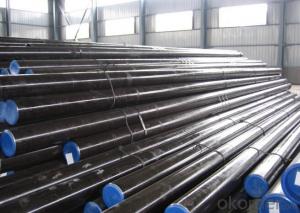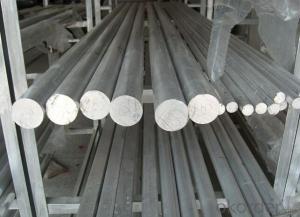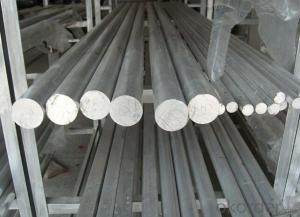Round Bar Alloy Steel SAE5160 Spring Steel Special Steel
- Loading Port:
- China main port
- Payment Terms:
- TT OR LC
- Min Order Qty:
- 30 m.t.
- Supply Capability:
- 10000 m.t./month
OKorder Service Pledge
OKorder Financial Service
You Might Also Like
Item specifice
SAE5160 Spring Steel
1. Material: 65Mn, 60Si2Mn, 50CrVA, SUP-9 etc.
2. Type: Smooth Plain, Double grooved.
3. Specifications: A variety of sizes from 5*45 to 30*150mm. We can produce according to customers' requirements, can customize for you.
4.Features: high strength & toughness; good hardenability & plasticity; excellent decarburization
; strong resistance & good elasticity; perfect machinability
5. Usage: Automobile laminated leaf spring, agricultural machinery & implements(rotary coulter), tools and machines etc.
6. Packing: Standard seaworthy packing or as customer required
7. Application: High strength, high toughness, large sectionand and important modified parts
Product show
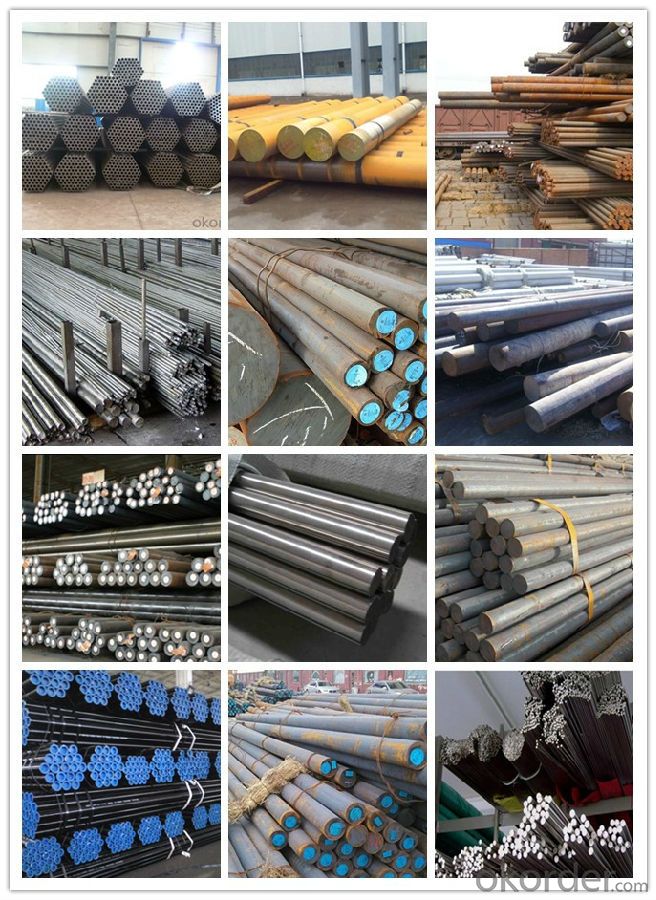
Workshop show
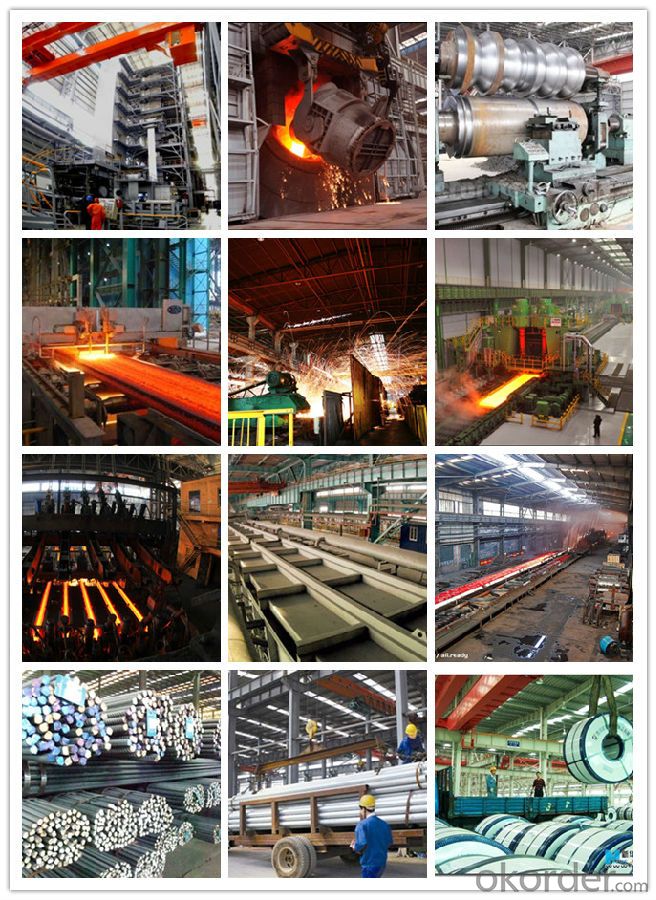
Shipping
1. FedEx/DHL/UPS/TNT for samples, Door-to-Door;
2. By Air or by Sea for batch goods, for FCL; Airport/ Port receiving;
3. Customers specifying freight forwarders or negotiable shipping methods!
Delivery Time: 3-7 days for samples; 5-25 days for batch goods.
Payment Terms
1.Payment: T/T, L/C, Western Union, MoneyGram,PayPal; 30% deposits; 70% balance before delivery.
2.MOQ: 1pcs
3.Warranty : 3 years
4.Package Informations: 1) EXPORT, In 20 feet (GW 25 ton) or 40 feet Container (GW 25 ton)
2)as customer's requirement
Main Product
Plastic Mould Steel
DIN 1.2311,1.2738,1.2083,1.2316 etc.
AISI P20,P20+Ni,420 etc.
JIS SUS420J2
Hot Work Steel
DIN 1.2344,1.2343,1.2367,1.2365,1.2581,1.2713 etc.
AISI H13,H11,H10,H21, etc.
JIS SKD61,SKD6,SKD5,SKT4 etc.
Cold Work Steel
DIN 1.2739, 1.2601, 1.2080, 1.2436, 1.2631, 1.263, 1.2510, 1.2327 etc.
AISI D2, D5, D3, D6, A8, A2, O1 etc.
JIS SKD10, SKD11, SKD1, SKS3 etc.
High Speed Steel
DIN 1.3343, 1.3243, 1.3247, 1.3355 etc.
AISI M2, M35, M42, T1 etc.
JIS SKH51, SKH35, SKH59, SKH2 etc.
Alloy Structural Steel
DIN 1.7035,1.6511,1.7220,1.7225 etc.
AISI 5140, 4340, 4135, 4140 etc.
JIS SCr440,SNCM439,SCM435,SCM440 etc.
Stainless & Carbon Steel or Others
DIN 1.4125,1.1191 etc
AISI 440C,1045, 1020 etc.
JIS SUS440C,S45C etc
Why choose us?
(1) The leading exporter in China special steel industry.
(2) Large stocks for various sizes, fast delivery date.
(3) Good business relationship with China famous factories.
(4) More than 7 years steel exporting experience.
(5) Good after-sales service guarantee.
- Q:What are the requirements for special steel used in textile machinery?
- The requirements for special steel used in textile machinery include high strength and durability, excellent corrosion resistance, good wear resistance, and the ability to withstand high temperatures and pressures. Additionally, the steel should have good machinability and be able to maintain dimensional stability under various operating conditions.
- Q:How does special steel contribute to the automotive fuel efficiency?
- Special steel contributes to automotive fuel efficiency in several ways. Firstly, special steel is often used in the construction of lighter and stronger components such as the chassis, body panels, and engine parts. This reduces the overall weight of the vehicle, leading to improved fuel economy. Secondly, special steel can be used in the manufacturing of components like exhaust systems, which are designed to reduce emissions and improve fuel efficiency. Additionally, special steel can also be utilized in the production of more efficient engine designs, such as turbochargers, which enhance the power output while minimizing fuel consumption. Overall, the use of special steel in the automotive industry plays a crucial role in enhancing fuel efficiency and reducing environmental impact.
- Q:What is the role of alloying elements in special steel?
- The role of alloying elements in special steel is crucial as their addition enhances the properties and characteristics of the steel. These elements are added in specific quantities and combinations to impart desirable traits such as increased strength, improved corrosion resistance, enhanced hardness, and superior heat resistance. One of the most common alloying elements used in special steel is chromium. Chromium helps in increasing the steel's resistance to corrosion and oxidation, making it suitable for applications in harsh environments. Additionally, it improves the steel's hardness and wear resistance. Another important alloying element is nickel. Nickel increases the steel's toughness, ductility, and strength, making it ideal for applications that require high strength and resilience. It also enhances the steel's resistance to corrosion and improves its ability to withstand high temperatures. Molybdenum is often used as an alloying element in special steel to enhance its strength, hardness, and toughness. It also improves the steel's resistance to corrosion and high-temperature environments. Manganese is another alloying element that contributes to the steel's strength, hardness, and wear resistance. Other alloying elements like vanadium, tungsten, and cobalt are used to further enhance specific properties of special steel. Vanadium, for example, improves the steel's strength, toughness, and wear resistance. Tungsten increases the steel's hardness, strength, and high-temperature resistance. Cobalt enhances the steel's magnetic properties, strength, and resistance to wear and corrosion. In summary, the role of alloying elements in special steel is to improve its properties and performance, making it suitable for specialized applications. By carefully selecting and incorporating these elements, manufacturers can tailor the steel to meet specific requirements, ensuring optimal performance in various industries such as aerospace, automotive, construction, and oil and gas.
- Q:How is high-strength steel used in the automotive industry?
- High-strength steel is widely used in the automotive industry for its ability to enhance the safety and performance of vehicles. It is used in various components such as the frame, chassis, and body structure to improve structural integrity, reduce weight, and provide better crash protection. Additionally, high-strength steel allows automakers to design vehicles with improved fuel efficiency and increased load-carrying capacity, making it a crucial material in modern automotive manufacturing.
- Q:What are the different types of wear-resistant steel?
- There are several different types of wear-resistant steel, including AR400, AR500, HARDOX, and DOMEX. These types of steel are specifically designed to withstand abrasive wear and impact, making them ideal for applications such as mining equipment, excavator buckets, and conveyor systems. They have high hardness and toughness properties, which help to prolong the lifespan of the equipment and reduce maintenance costs.
- Q:What are the specific requirements for special steel used in the nuclear waste storage industry?
- The specific requirements for special steel used in the nuclear waste storage industry are stringent and critical for ensuring the safety and long-term viability of the storage facilities. These requirements are primarily driven by the need to mitigate the potential risks associated with nuclear waste, such as radiation leakage and corrosion. One of the key requirements is high strength and durability. Special steel used in nuclear waste storage must have exceptional mechanical properties to withstand the weight and pressure exerted by the waste containers and the surrounding environment. This includes resistance to deformation, fracture, and fatigue, as well as the ability to maintain its structural integrity over an extended period. Another crucial requirement is excellent corrosion resistance. Nuclear waste contains highly corrosive substances that can degrade regular steel over time. Therefore, special steel used in the nuclear waste storage industry must have enhanced corrosion resistance to ensure long-term durability and prevent leakage of radioactive materials. Moreover, the steel must have a low susceptibility to stress corrosion cracking (SCC). SCC occurs when a combination of tensile stress, corrosive environment, and specific material conditions result in crack initiation and propagation. Given the potential consequences of a breach in the storage facility, the steel used must be highly resistant to SCC to ensure the integrity of the containers and minimize the risk of leakage. Radiation resistance is also a critical requirement for special steel used in nuclear waste storage. The steel should exhibit minimal degradation or embrittlement when exposed to high levels of radiation. This is essential to maintain the structural integrity of the storage containers and prevent any weakening that could compromise the containment of the waste. Additionally, the special steel used in the nuclear waste storage industry must comply with strict regulatory standards and certifications. It must meet specific design codes and guidelines set by regulatory authorities to ensure compliance with safety regulations and minimize potential hazards. In summary, the specific requirements for special steel used in the nuclear waste storage industry include high strength, durability, corrosion resistance, low susceptibility to stress corrosion cracking, radiation resistance, and compliance with regulatory standards. These requirements are crucial for maintaining the safety and integrity of the storage facilities and preventing any leakage or release of radioactive materials into the environment.
- Q:How is maraging steel used in the production of rocket and missile components?
- Maraging steel is utilized in the manufacturing of rocket and missile components due to its exceptional strength, toughness, and resistance to fatigue and stress. Its unique properties make it ideal for critical parts such as pressure vessels, casings, nozzles, and structural elements, where high-performance materials are required to withstand extreme conditions during launch and flight. Maraging steel's ability to maintain its integrity under intense heat, pressure, and vibrations makes it a crucial material for ensuring the reliability and safety of rocket and missile systems.
- Q:Can special steel be used in the textile industry?
- Yes, special steel can be used in the textile industry. Special steel alloys, such as stainless steel, can be used for textile machinery components like needles, pins, and various parts of looms. These steel alloys provide excellent strength, corrosion resistance, and durability, making them suitable for demanding textile manufacturing processes.
- Q:What are the different methods of measuring the hardness of special steel?
- There are several methods available for measuring the hardness of special steel. These methods can be categorized into two main categories: destructive and non-destructive testing. 1. Rockwell Hardness Test: This is a widely used destructive testing method that measures the depth of penetration of an indenter into the steel surface. The Rockwell hardness test provides a hardness value based on the resistance of the steel to indentation. It is a simple and quick method that requires minimal sample preparation. 2. Brinell Hardness Test: Another destructive testing method, the Brinell hardness test, involves applying a known load to a hardened steel ball and measuring the diameter of the indentation left on the steel surface. The hardness value is determined based on the ratio of the applied load to the surface area of the indentation. 3. Vickers Hardness Test: This is a micro-indentation test that utilizes a diamond pyramid-shaped indenter. The Vickers hardness test measures the diagonal length of the indentation left on the steel surface and calculates the hardness value based on the applied load. 4. Knoop Hardness Test: Similar to the Vickers test, the Knoop hardness test is a micro-indentation method that uses a diamond pyramid-shaped indenter. However, instead of measuring the diagonal length of the indentation, it measures the length of the long axis. This test is particularly useful for measuring the hardness of thin steel samples or steel coatings. 5. Ultrasonic Hardness Test: This non-destructive testing method measures the hardness of steel by analyzing the propagation of ultrasonic waves through the material. The hardness value is determined based on the correlation between the velocity of the waves and the hardness of the steel. 6. Magnetic Hardness Test: This non-destructive testing method utilizes magnetic properties to measure the hardness of steel. It involves applying a magnetic field to the steel and measuring the magnetic response. The hardness value is determined based on the correlation between the magnetic response and the hardness of the steel. It is important to note that each method has its advantages and limitations, and the choice of method depends on factors such as the type of steel, the required accuracy, the sample size, and the available equipment and expertise.
- Q:What are the main characteristics of alloy steel?
- Alloy steel is a type of steel that is made by adding certain elements, such as chromium, nickel, or molybdenum, to iron. These additional elements give alloy steel its unique properties and characteristics. Some of the main characteristics of alloy steel include: 1. High strength: Alloy steel is known for its exceptional strength. The addition of alloying elements enhances the steel's ability to withstand high pressures and heavy loads, making it ideal for applications that require a strong and durable material. 2. Hardness: Alloy steel is also known for its hardness. It has a higher level of hardness than regular carbon steel, which makes it resistant to wear, abrasion, and deformation. This characteristic makes alloy steel suitable for applications where resistance to impact or wear is crucial, such as in the manufacturing of cutting tools or machinery parts. 3. Corrosion resistance: Depending on the specific alloying elements added, alloy steel can exhibit excellent resistance to corrosion. Chromium, for example, is commonly added to alloy steel to create stainless steel, which is highly resistant to rust and corrosion. This characteristic makes alloy steel a preferred material in industries where exposure to moisture or corrosive environments is common. 4. Heat resistance: Alloy steel is known for its ability to withstand high temperatures without losing its strength or structural integrity. The addition of elements like nickel, molybdenum, or vanadium enhances the steel's ability to resist thermal expansion, oxidation, and softening at elevated temperatures. This characteristic makes alloy steel suitable for applications in the aerospace, automotive, and power generation industries. 5. Versatility: Alloy steel is a versatile material that can be easily customized to meet specific requirements. By varying the composition and proportions of alloying elements, manufacturers can create alloy steel with a wide range of properties, such as improved ductility, toughness, or electrical conductivity. This versatility allows alloy steel to be used in various industries, including construction, manufacturing, and engineering. Overall, the main characteristics of alloy steel are high strength, hardness, corrosion resistance, heat resistance, and versatility. These properties make alloy steel a preferred choice for a wide range of applications that require a strong, durable, and reliable material.
1. Manufacturer Overview |
|
|---|---|
| Location | |
| Year Established | |
| Annual Output Value | |
| Main Markets | |
| Company Certifications | |
2. Manufacturer Certificates |
|
|---|---|
| a) Certification Name | |
| Range | |
| Reference | |
| Validity Period | |
3. Manufacturer Capability |
|
|---|---|
| a)Trade Capacity | |
| Nearest Port | |
| Export Percentage | |
| No.of Employees in Trade Department | |
| Language Spoken: | |
| b)Factory Information | |
| Factory Size: | |
| No. of Production Lines | |
| Contract Manufacturing | |
| Product Price Range | |
Send your message to us
Round Bar Alloy Steel SAE5160 Spring Steel Special Steel
- Loading Port:
- China main port
- Payment Terms:
- TT OR LC
- Min Order Qty:
- 30 m.t.
- Supply Capability:
- 10000 m.t./month
OKorder Service Pledge
OKorder Financial Service
Similar products
New products
Hot products
Hot Searches
Related keywords
